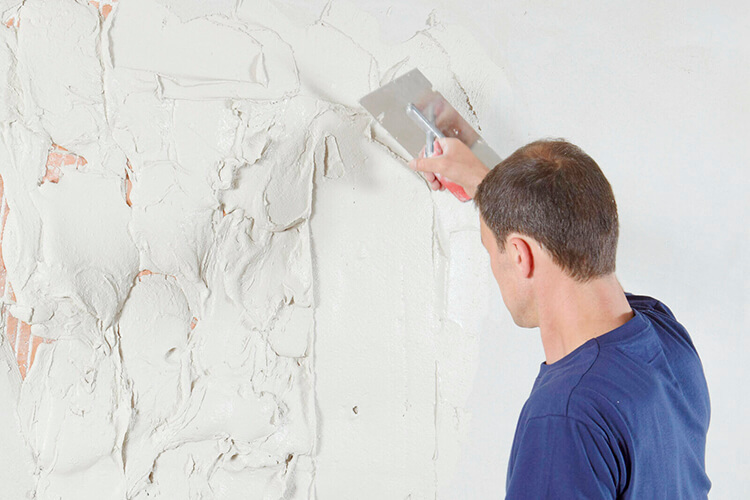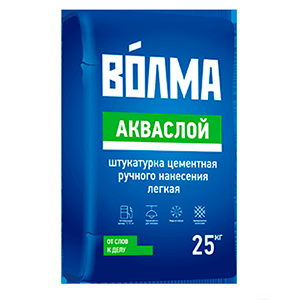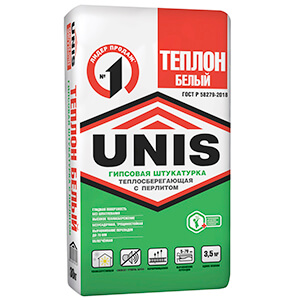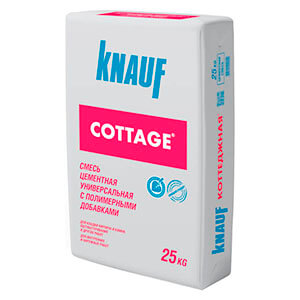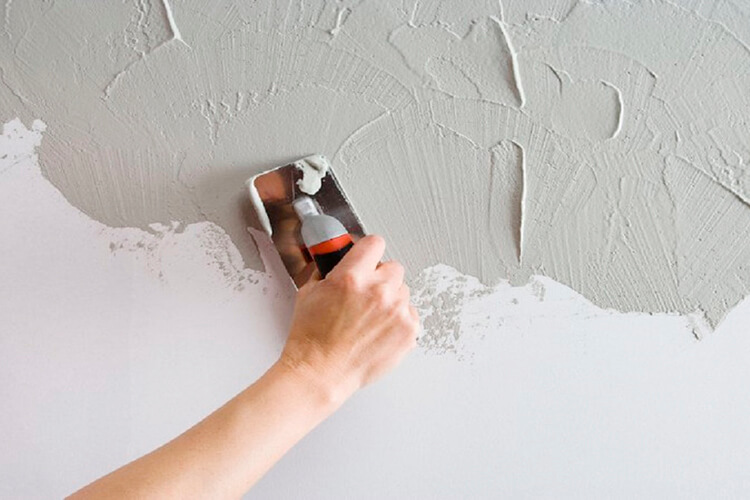Top 20 best plasters: ranking 2024-2025 and how to choose a plaster for the facade and walls in the apartment
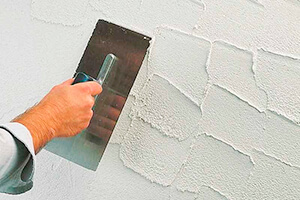 Plaster is the most important element of finishing surfaces of buildings under construction. The modern construction industry offers many ready-made materials for this purpose, which saves builders from having to make plaster with their own hands.
Plaster is the most important element of finishing surfaces of buildings under construction. The modern construction industry offers many ready-made materials for this purpose, which saves builders from having to make plaster with their own hands.
Ready-made materials allow for high quality finishing, saving time and effort. The Russian construction market is filled with numerous ready-to-use plaster mixes, and you only need to choose the best option with regard to specific requirements.
The article presents a rating of plasters for various purposes. It is compiled on the basis of consumer reviews, evaluations of experts and conclusions of experts.
Rating TOP-20 best plasters for 2024-2025
On the Russian construction market, there are a large number of domestic and foreign plasters with different compositions. They can have universal or specific application. It is important when choosing a material to proceed from the main criteria and correctly assess specific operating conditions.
Ratings of plasters of different purposes, compiled taking into account the opinion of consumers and evaluations of specialists, will help you choose the best option.
| Place | Name | Price |
|---|---|---|
| Top 3 best plasters by price | ||
| 1 | KNAUF Rotband | |
| 2 | Volma Holst | |
| 3 | Weber Vetonit | |
| Top 3 best plasters for interior work | ||
| 1 | Volma Layer | |
| 2 | Starateli | |
| 3 | Ceresit CT 24 | |
| Top 3 best plasters for bathroom and kitchen | ||
| 1 | Paladium Palaplaste | |
| 2 | Volma Aqualayer | |
| 3 | Unis Teplon | |
| Top 3 best facade plasters | ||
| 1 | Unis Silin | |
| 2 | Litokol Litoplan | |
| 3 | KNAUF Cottage | |
| Top 3 best machine applied plasters | ||
| 1 | KNAUF MP-75 | |
| 2 | Volma Gips-Aktiv | |
| 3 | Weber.vetonit | |
| Top 3 best cement plasters | ||
| 1 | Mapei Nivoplan Plus | |
| 2 | KNAUF Grunband | |
| 3 | Volma Akvaplast | |
| Top 2 best gypsum plasters | ||
| 1 | Rusean Plaster | |
| 2 | Starateli Optimum | |
Synopsis of [Show]
How to choose the right plaster?
In order to choose the right plaster, you need to pay attention to several important criteria. First of all, you should consider that the mixes differ in composition.
You can distinguish such basic varieties:
- Cement mixtures. Its basis is cement, which makes it possible to use both for internal and external finishing. It is possible to apply such plaster in rooms with high humidity and temperature. It is important to ensure good adhesion to the surface.
- Gypsum plaster. It is designed only for internal works. The mixture is easy to apply, because. has a favorable consistency and plasticity, hardens quickly.
- Lime plaster. It has low moisture resistance, and therefore is used only indoors. The main advantages: environmental friendliness, ease of application, affordable price.
- Clay mixture. It should be used for external finishing. The most suitable material for plastering wooden surfaces.
Plaster mixes are divided according to their purpose.
Ordinary plasters may have such designs:
- For exterior work or facade plaster. It has increased water resistance, resistance to sunlight ultraviolet, weathering, temperature differences.
- For interior work .. Such mixes are not subject to requirements for weathering resistance, frost resistance and reduced requirements for water resistance. The main criteria are environmental friendliness and manufacturability.
- Leveling plaster. It is characterized by the fact that it can be applied with great thickness to eliminate significant surface irregularities, for example, on the slabs.
- Universal plaster. It can be used for exterior and interior work, as well as for leveling surfaces.
Under extreme conditions there is a need for special plaster mixes.
It is possible to distinguish such their varieties:
- Plaster with enhanced thermal and acoustic insulation properties. Special additives (foam glass, polystyrene foam, etc.) are introduced into the mixture.
- Waterproofing plaster. Special additives provide water resistance, which is important when finishing plinths, basements and swimming pools.
- Lightweight plaster. It is needed for finishing structures of low strength and for applying a layer of increased thickness.
In special conditions plasters with increased resistance to aggressive environments, in particular acid-resistant materials can be used.
When selecting a plaster, the following basic parameters should be taken into account:
- Purpose. Universal and special mixtures are more expensive, and therefore should be based on specific operational requirements.
- Density and consistency. The thickness of the applied layer and the quality of the surface depend on this parameter. Elastic materials are easier to apply and flatten.
- Fast drying time. It should be borne in mind that the rapid hardening of the mixture accelerates the work, but excessive speed makes it difficult to level and does not allow you to prepare the right amount of mortar at once.
- Water resistance and temperature regime. When choosing a plaster for exterior works, it is necessary to take into account weathering, including frost resistance. Increased requirements are made for finishing rooms with high humidity (bathrooms, bathrooms, basements, etc.).
- The way of overlaying. As a rule, mixtures are chosen for manual finishing with standard tools. With a large amount of work will require plaster for machine application.
Often the main criterion becomes the cost of the material. However, it should be borne in mind that such savings can translate into subsequent significant costs. Each time, it is necessary to proceed from the actual operating conditions.
Top 3 best plasters by price
The favorable price of plaster can be combined with the high quality of the material. This has been proven by many well-known manufacturers. Below are the top 3 best plasters, which have an optimal combination of cost and quality.
The rating is based on the opinion of consumers and the conclusions of experts.
KNAUF Rotband
The leader of the rating among the cheap plasters is recognized KNAUF Rotband. This is a dry gypsum mixture for interior work. It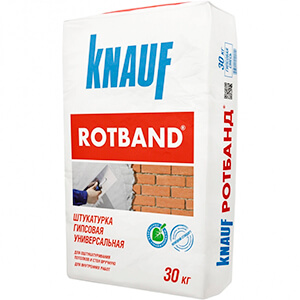
The plaster can be applied to gypsum boards, foam-gas concrete, concrete, cement surface, thermal insulation of various types. To prepare the solution it is sufficient to mix it with water at a ratio of 1 kg per 0.6 l and mix thoroughly. After the application a smooth surface is formed.
The material is not suitable for exterior works, but it is ideal for interior finishing of the room.
Technical characteristics:
- grit size - not more than 1.2 mm;
- The thickness of the applied layer - from 5 to 50 mm;
- application temperature - not lower than 5 °C.
Plaster is supplied in 30 kg bags.
- great thickness of application;
- high adhesion to most wall and ceiling surfaces;
- provision of even, smooth surface, suitable for painting.
- were not detected.
Volma Holst
Among the leaders of the rating, the Russian plaster Volma Holst stands out. This dry plaster on a gypsum base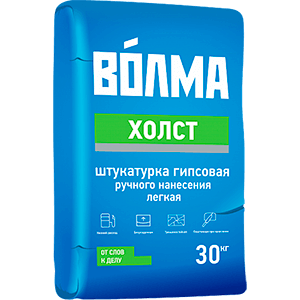
It can be applied with a thickness of up to 3 cm, which allows you to level significant defects of surfaces. The mixture is diluted with water at the rate of 1 kg per 0.65 liters. The plaster is designed for finishing dry rooms.
In general, the material is characterized by good elasticity and an even surface.
Technical characteristics:
- layer thickness - from 5 to 30 mm;
- Plastering temperature - 5 to 30 ° C
- consumption with a 1 cm layer thickness - up to 10 kg/m2;
- curing time - 20 min.
- economical consumption;
- convenient packaging;
- ease of application;
- optimal combination of price and quality.
- some consumers are not happy with the gray shade of plaster.
Weber Vetonit
The top three best plasters at an affordable price in 2024-2025 closes the dry mix Weber Vetonit TT40. It has a cement base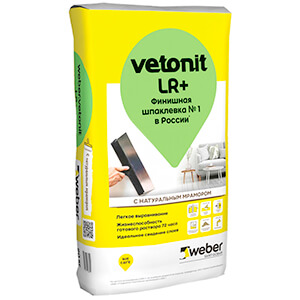
It can be applied to foam blocks, concrete and cement plaster. It is supplied in 25 kg bags. Dissolved in water in the ratio of 1 kg to 0.17 l. After finishing, a grainy surface texture is formed.
The material attracts its versatility, the possibility of use in rooms with high humidity and in exterior finishing.
Technical characteristics:
- grit size - not more than 1.2 mm;
- layer thickness - from 5 to 40 mm
- Plastering temperature - not lower than 0 ° C;
- consumption at layer thickness of 1 mm - 1.2 kg/m2;
- curing time - 120 min.
- universality;
- ease of preparation and application;
- low cost;
- Increased frost resistance and water resistance;
- possibility of machine application.
- gray tint;.
- long curing time.
Top 3 best plasters for interior work
For interior finishing choose mixes that have a high technological capability and allow perfect leveling of walls and ceilings.
According to buyers and experts in 2024-2025, the top 3 best plasters for interior work is as follows.
Volma Layer
In first place is recommended Russian plaster Volma Layer. This dry gypsum mixture is quickly prepared and perfectly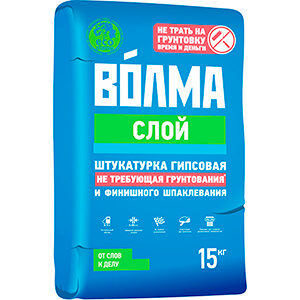
Plaster is good for leveling significant defects. It is designed for decorative plaster, painting, tiling and other finishing coatings.
Technical characteristics:
- the thickness of the application - from 5 to 30 mm;
- plastering temperature - from 5 to 30 ° C;
- Consumption at a thickness of 1 cm - up to 9 kg/m2;
- Pot life of prepared mixture - 20 min.
- high-quality surface;
- easy application with standard tools;
- possibility of applying a sufficiently thick layer;
- low consumption.
- plaster is designed only for dry rooms, which limits its use for kitchens and balconies.
Starateli
Among the leaders of the rating is another Russian plaster - Starateli Gypsum. This is a white mixture for internal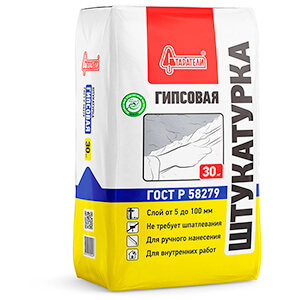
It forms a smooth surface texture. It is diluted in water at a ratio of 1 kg to 550 ml. It belongs to the leveling category, because it can be applied by layers up to 10 cm. It can be applied in layers up to 10 cm. Packaging is 30 kg. It can be used to plaster walls and the ceiling.
In dry rooms it shows itself perfectly and has an increased durability.
Technical characteristics:
- Application thickness - from 5 to 50 mm (in some places - up to 100 mm) ;
- application temperature - from 5 to 30 ° C;
- Consumption at a thickness of 1 cm - about 9 kg/m2;
- Pot life of the prepared mixture - 45 minutes.
- perfect white color;
- high elasticity;
- affordable price;
- high manufacturability.
- plaster is not suitable for finishing of baths and bathrooms.
Ceresit CT 24
In the top 3 best plasters for interior finishing includes the mixture Ceresit CT 24 Ligh on a cement basis. It can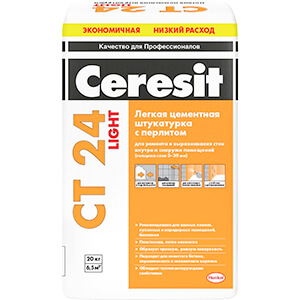
The plaster is intended for finishing walls. The basic color is orange. The mixture is sold in dry form in packages of 20 kg. It is dissolved in water in the ratio of 1 kg to 0.4 l.
Technical characteristics:
- the thickness of application - from 3 to 30 mm;
- Plastering temperature - from 5 to 30 ° C;
- Consumption at a thickness of 1 mm - up to 1.1 kg/m2;
- Pot life of prepared mixture - 2 hours.
- the possibility of applying a thin layer;
- water resistance;
- possibility of machine application;
- frost resistance class F75.
- the bright color of the plaster creates certain difficulties. Special characteristics lead to higher costs.
Top 3 best plasters for bathrooms and kitchens
Special requirements are put forward for plaster for bathrooms and kitchens. Here increased moisture resistance and resistance to temperature fluctuations are required.
An analysis of consumer reviews and expert reviews allows us to compile the top 3 best plasters of this type in 2024-2025.
Paladium Palaplaste
The majority of buyers and experts put Paladium PalaplasteR-205 plaster at the top of the ranking.
This water-resistant cement-based plaster mix is sold in dry form. It is diluted in water in the ratio of 1 kg per 180 ml. It can be applied to gas and foam blocks, stone, concrete and cement surfaces.
It can be used for finishing facades. After application it forms a grainy surface texture.
Technical characteristics:
- granularity - up to 3 mm;
- Layer thickness - 5 to 50 mm;
- Temperature of application - from 5 to 30 ° C;
- consumption with a 1 cm layer thickness - up to 16 kg.
- high moisture resistance;
- versatility;
- machine and manual application;
- frost resistance class F50.
- consumers do not find serious disadvantages, but some note the increased consumption of plaster. This disadvantage is fully covered by the low cost.
Volma Aqualayer
Among Russian water-resistant plasters, the mixture Volma Akvasloy stands out. Its basis is cement.
It is used as a levelling compound, for finishing walls and ceilings, including for decorative trim and tiling. It forms a granular surface. Plaster is designed for wet rooms and exterior works (facades, plinths). Dry mixture is diluted in water at a ratio of 1 kg per 300 ml.
Technical specifications:
- grit size - up to 1.2 mm;
- The thickness of the applied layer - from 10 to 30 mm;
- temperature of use - from 5 to 30 ° C
- consumption at a 1 cm layer - up to 12 kg/m2;
- curing time - 2 h.
- Most customers are fully satisfied with the quality of the material.
- Reduced frost resistance - down to -35 ° C.
Unis Teplon
Almost unanimously in the top 3 best plasters for wet rooms in 2024-2025 includes gypsum mixture Unis Teplon white.
Special additives ensure its high moisture resistance, which makes it possible to use in bathrooms. Plaster forms a smooth surface texture. The dry mixture is diluted with water: 1 kg per 0.5 l. It is supplied in packages of 30 kg.
For bathrooms and kitchens the mixture is ideal and has an increased durability.
Technical specifications:
- overlay thickness - 5 to 50 mm;
- temperature of application - not lower than 5°C;
- Consumption at a thickness of 5 mm - up to 4.5 kg/m2;
- The mortar should be used within 50 minutes.
- white color
- possibility of machine application;
- ease of application;
- affordable price.
- can only be used for interior work.
Top 3 best facade plasters
To finish the facade of buildings, you need a material that can withstand weathering.
Below is the top 3 best plasters for facades in 2024-2025, compiled by the reviews of private consumers and professional builders.
Unis Silin
The best facade plaster is recognized by Unis Silin. It perfectly protects the facade from external influences and creates a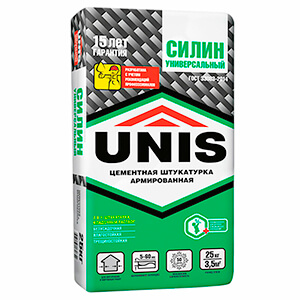
The plaster has a cement base and additives that increase water resistance. It is sold as a dry mixture, diluted in water in the proportion of 1 kg per 200 ml. With its help it is possible to level significant defects.
Plaster has high resistance to external influences, sufficient frost resistance and increased durability.
Technical characteristics:
- layer thickness - from 5 to 30 mm;
- the temperature of application - not lower than 5 ° C;
- grit size - not more than 2.5 mm;
- curing time - 2 h.
- versatility, possibility of use for exterior and interior works;
- low cost;
- absence of toxic substances;
- high manufacturability.
- were not found.
Litokol Litoplan
In second place in the ranking is Litokol Litoplan cement-based facade plaster. It comes in the form of a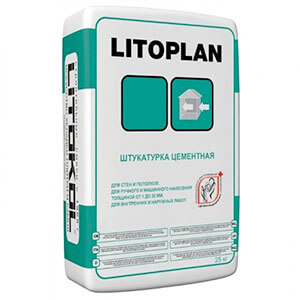
It is recommended for finishing the facade above the plinth and any damp rooms inside. Can be used to cover brick, concrete and block walls. Good for levelling the surface under ceramic tiles. The dry mixture is diluted in water in the ratio of 1 kg per 250 ml.
Technical characteristics:
- the thickness of the applied layer - from 1 to 20 mm;
- Grain size - no more than 1 mm;
- Plastering temperature - from 5 to 35 ° C;
- consumption at layer thickness of 1 mm - up to 1.8 kg/m2;
- Efficiency of the ready mortar - 2 hours.
- high plasticity
- easy application;
- high water resistance;
- thixotropic consistency;
- possibility of applying a layer of 1 mm.
- overpriced, but it is fully compensated by the high quality of the material.
KNAUF Cottage
KNAUF Cottage facade plaster deserves high marks from buyers and experts.
This dry mix is made on the basis of cement, polymer additives and fillers. It is designed for plastering walls outside and inside the premises with high humidity. Can be used to repair old plaster layer. Dry mixture is diluted in water: 1 kg per 200 ml.
Technical specifications:
- grit - no more than 3 mm;
- layer thickness - 1 to 20 mm;
- consumption with the layer thickness of 1 cm - up to 18 kg/m2;
- frost resistance - F25.
- high quality;
- affordable price.
- Increased plaster consumption during leveling.
Top 3 best plasters for machine application
With a significant amount of finishing work, manual plastering takes too much time. To speed up the process, a mechanized method using special devices is used. Machine application of plaster requires a mixture designed for this purpose.
According to consumer reviews and taking into account the opinion of experts, we can compile the top 3 best such plasters for 2024-2025.
KNAUF MP-75
The best plaster for machine application is recognized as KNAUF MP-75. It is a dry mixture based on gypsum with the addition of polymer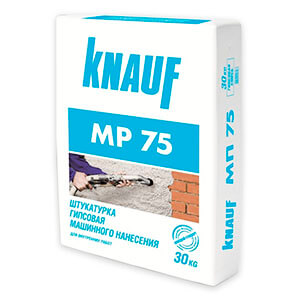
Plaster can be applied to almost any hard surface - brick, concrete, cement plaster, foam blocks, etc. They are also used for bathrooms, but with the application of a protective layer.
The mixture is designed for interior work in rooms with normal humidity. After application it forms a smooth surface that does not require additional puttying.
Technical characteristics:
- layer thickness - from 8 to 50 mm:
- granularity - not more than 1.2 mm;
- Consumption at a thickness of 1 cm - up to 9 kg/m2;
- application temperature - at least 5 ° C.
- high productivity;
- versatility;
- breathability;
- eco-friendliness.
- some inconvenience may bring uneven color, which can range from white to gray and have a pink tint. After finishing this disadvantage does not manifest itself in any way.
Volma Gips-Aktiv
Among Russian plasters, Volma Gips-Aktiv for professional use stands out. The basis of the dry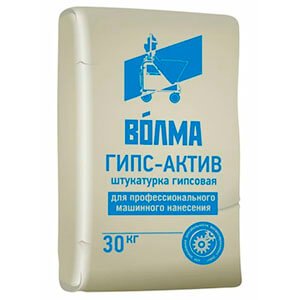
Plaster provides high adhesion to hard surfaces of walls and ceilings. Complete hardening of the mortar occurs within 6-7 days. The dry mixture is diluted in water at a ratio of 1 kg to 0.6 l.
Technical characteristics:
- layer thickness - from 5 to 60 mm;
- Application temperature - from 5 to 30 ° C
- Consumption with the layer thickness of 1 cm - up to 9 kg/m2;
- Pot life - 90 min.
- high adhesion
- water-holding capacity;
- increased vitality of the mortar;
- lower consumption.
- some consumers are dissatisfied with the long period until the plaster solidifies completely. However, there are no serious complaints about the plastering process itself.
Weber.vetonit
Among the leaders of the rating is the excellent plaster Weber.vetonit Professional Plaster Reinforced.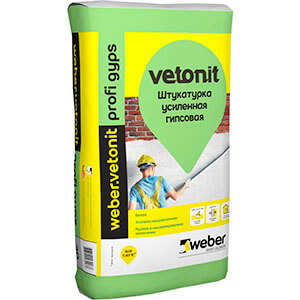
This dry mixture is made from gypsum with the addition of polymer components. It is designed for leveling walls and ceilings inside premises with normal humidity. It can be used when finishing kitchens, corridors and loggias. It is well applied to bricks, foam blocks and concrete.
The mixture is reinforced with microfiber, which increases its mechanical strength.
Technical characteristics:
- grit size - not more than 1.25 mm;
- the layer thickness - from 5 to 50 mm, in some places it is possible to apply - up to 100 mm;
- consumption at a thickness of 1 cm - not more than 10 kg/m2;
- water consumption - 0.5 l/kg of mixture;
- time of use of the ready mortar - 40 min.
- higher resistance to cracking;
- easy application at high speed;
- high plasticity;
- increased strength.
- increased cost, but the price is quite consistent with the high quality plaster and the possibility of use by professionals.
Top 3 best cement plasters
Many builders of private houses prefer universal plasters, which can be used for both internal and external works.
Quality mixes of this type are made on a cement base. Below are the top 3 best cement-based putties for 2024-2025, which takes into account the opinions of consumers-amateurs and professionals.
Mapei Nivoplan Plus
One of the best cement plasters is rightly recognized as Mapei Nivoplan Plus. It efficiently levels walls and ceilings and can also be used for façades.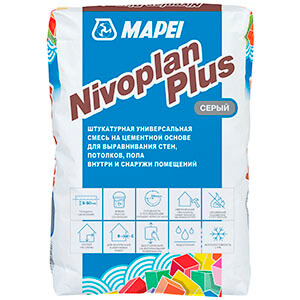
The plaster can easily be applied on stone, brick, foam blocks, concrete, primed gypsum surfaces. It is suitable for manual and machine plastering.
Technical characteristics:
- the thickness of the applied layer - from 5 to 50 mm;
- Consumption at a thickness of 1 cm - up to 16 kg/m2;
- Pot life - 2 hours;
- full drying time - 1 day.
- quality leveling even with significant defects of surface;
- rapid drying;
- universality;
- affordable price.
- serious disadvantages are not reported by consumers. They are quite satisfied with the high quality of the material and plaster resistance to external influences.
KNAUF Grunband
Perfect German quality is distinguished by the cement plaster KNAUF Grunband. In addition to cement it contains light fillers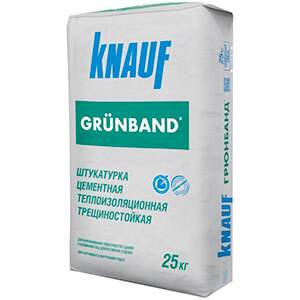
The mixture is designed for internal works in damp rooms and external works on facades. It can be applied on ceramic and silicate bricks, concrete, gas, foam and expanded clay aggregate blocks.
Plaster perfectly levels walls for decorative plaster and painting.
Technical characteristics:
- layer thickness - from 10 to 30 mm;
- Grain content - not more than 1.5 mm;
- density - not more than 1100 kg/m3;
- consumption at layer thickness of 1 cm - not more than 12 kg/m2.
- lower density;
- excellent adhesion to the concrete;
- water absorption - not more than 15%;
- availability of heat insulating properties.
- no serious disadvantages detected. Consumers are fully satisfied with the versatility of plaster, its plasticity, vitality and increased durability.
Volma-Aquaplast
In the top three of the best cement plasters is a domestic dry mix Volma-Akvaplast. It is made on the basis of Portland cement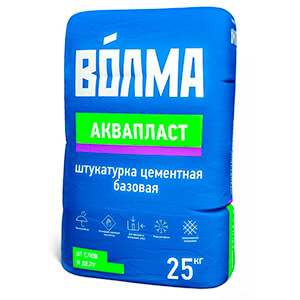
Plaster has high water resistance, which makes it possible to use in wet rooms and for exterior works. Can be used to repair old plastered surfaces.
Technical characteristics:
- maximum layer thickness - up to 60 mm, recommended thickness - 10-30 mm;
- Grain size - not more than 1.25 mm;
- Water consumption while preparing the mortar - 200 mg/kg;
- consumption of the mixture with the layer thickness of 1 cm - not more than 18 kg/m2;
- workability - not less than 120 minutes.
- high resistance to cracking;
- increased mechanical strength through fiber reinforcement;
- improved performance properties;
- lighter weight.
- plaster can be used at temperatures below minus 40 ° C, which somewhat limits its use in the Northern regions. For areas with moderate climates, the mixture meets all the requirements, and can serve for many years.
Top 2 best gypsum plasters
In urban conditions, when repairing an apartment most often there is a need for plaster for interior work. Such materials are not designed to be applied to exterior surfaces. Gypsum plasters are used for these purposes, providing a perfectly smooth surface.
Below are the top 2 such plaster mixes for 2024-2025.
Rusean Plaster.
The leading position among gypsum plasters is occupied by Rusean Plaster dry-mix. It is based on a gypsum base, light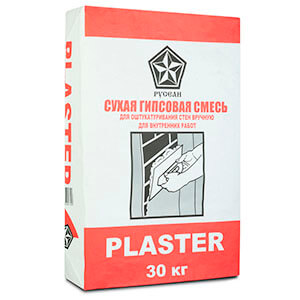
This plaster allows you to level the walls for wallpapering, painting and other finishing. The formed smooth surface does not need additional puttying. The mixture is designed for interior finishing of premises with normal humidity.
Technical characteristics:
- the thickness of the applied layer - from 2 to 30 mm;
- Plaster density - 1360-1400 kg/m3;
- Mixture consumption at a 1 cm layer - up to 9 kg/m2;
- compressive strength - 2.5 MPa.
- Soundproofing ability;
- no shrinkage during drying;
- absolute safety for humans;
- ease of application.
- plaster is designed to operate at temperatures from 5 to 30 ° C and normal humidity, which somewhat limits the use. However, in these conditions, the material is reliable and durable.
Starateli Optimum
Another excellent gypsum plaster - Russian dry mix Starateli Optimum. It is designed for internal works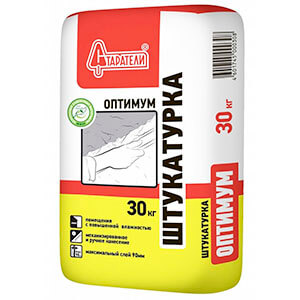
During operation it is allowed to damp cleaning. Dry mixture is diluted in water at a ratio of 1 kg to 450 ml. The color of plaster is light gray. The composition includes special modifying additives to improve the properties.
In conditions of normal humidity plaster provides high quality finishing of walls and ceilings.
Technical characteristics:
- the thickness of the recommended layer - from 5 to 60 mm;
- consumption of the mixture with the layer thickness of 1 cm - up to 11 kg/m2;
- mortar viability - more than 40 minutes;
- compressive strength - not less than 3 MPa.
- low cost;
- eco-friendliness;;
- plasticity;
- perfect levelling of the surface, even with large irregularities.
- consumers do not find significant disadvantages.
What company to choose?
The high quality of the material is provided only by proven manufacturers.
The most highly rated were such companies-manufacturers of plaster mixes:
- Knauf (Germany).. The company produces plasters of different purposes and composition. It has long mastered the Russian market and proved its attractiveness.
- Henkel (Germany). The company owns the well-known brand Ceresit.
- Weber Saint-Gobain (France).. The concern includes Saint-Gobain Construction Products Rus LLC, which owns the brand Weber. This plaster deserves the highest estimates.
- Baumit - is a European company with extensive experience in the production of finishing building materials. Its decorative and facade plasters, as well as dry mixes are valued.
Among the domestic manufacturers of high quality plaster can be highlighted:
- Volma (Russia, Volgograd).
- Neomid (St. Petersburg, Moscow).
- Holding INTERRA DECO GROUP (Bayramix plaster).
- OOO "Sea-irlaid" (Chelyabinsk, plaster INSI Block).
Useful video
How to choose a plaster for interior work:



